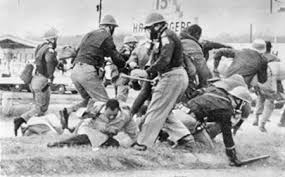Those of you who follow me on Facebook (and if you don't, please do
go over there and friend me up) know today is my birthday, an event I rarely spend much time celebrating. But I do take a certain pride in sharing the day with two notable events that appeal to some of my more radical impulses, and my belief in the power of collective action to make social and political change.
The first came on this day in 1932, a bitterly cold afternoon in Detroit. In the depths of the Great Depression, with hundreds of thousands of Detroiters out of work, local communists and other political radicals
arranged for a march on the Ford Rouge plant in the adjoining city of Dearborn. The march was a demand for food, work, and other aid from Henry Ford and his auto business, built through the labor of Detroit workers. Ford had struck a recalcitrant position during the Depression (which I'm detailing in the
Detroit: A Biography book project I expect to finish by the end of the month), refusing on principal to donate to local charities.
The march began under the watchful eye of Detroit police officers, but once it reached the Dearborn city line, all hell broke loose. First fire hoses, then guns, were turned on the marchers, who responded with fusillades of rocks. The bullets won. Four marchers were killed that afternoon; a fiifth died three months later of his injuries. The response from local police and the Wayne County district attorney: A crackdown on, and round up of, pro-union agitators in Detroit, and calls for the arrest of the national communist leader William Z. Foster who had the previous day encouraged Detroiters to join the march. None of the Dearborn police or Ford security men were held accountable. But the march became a rallying point for progressive activists who continued to push for aid for the starving working class in Detroit and elsewhere.

The second event came a generation later, in 1965, when some 600 Civil Rights activists had barely begun a
protest march from Selma to Montgomery before the Alabama state police met them with clubs and tear gas (in the picture at left, future U.S. Rep. John L. Lewis is beaten bloody by police). The marchers were routed, but in their failure they helped catalyze a movement. Two weeks later, armed with a court acknowledgement of their right to march in protest, some 25,000 people walked from Selma to Montgomery demanding the extension of civil rights to African Americans. Five months later, President Lyndon B. Johnson signed the Voting Rights Act of 1965 into law.
As I said, a couple of other events that occurred on this day in which we should all take pride, and which, as a nation, we ought not forget.
Read More



